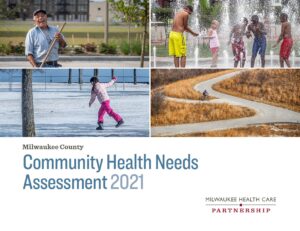Milwaukee Health Systems, MHCP Publish Shared Community Health Needs Assessment – Mental Health and Violence Top List of Health Needs
The health system members of the Milwaukee Health Care Partnership (MHCP) – Advocate Aurora Health, Ascension Wisconsin, Children’s Wisconsin, and Froedtert Health – announce the release of the 2021 Milwaukee County Community Health Needs Assessment (CHNA) revealing mental health, violence, drug use and overdose, alcohol use, and access to health care as top health issues.
Conducted in collaboration with the City of Milwaukee Health Department and ten other municipal health departments located in Milwaukee County, the assessment serves as the foundation from which health systems, community health centers, local health departments, and the MHCP consortium will develop community health improvement strategies.
“Since 2007, Milwaukee health systems have been working together to assess the needs of the community, expand access to care, and improve health outcomes,” said Carrie Killoran, MHCP Board Chair and President, Greater Milwaukee Patient Service Area and Aurora Sinai Medical Center with Aurora Advocate Health. “The findings from the shared CHNA will help inform our health systems’ specific and collective initiatives, investments, and partnerships; with a focus on addressing racial and health equity.”

The CHNA captures community input from an online survey of more than 8,600 Milwaukee County residents that addressed adult and child health risk factors, health behaviors, and perceptions of pressing community health needs. The assessment also includes findings from in-depth interviews and focus groups with a diverse array of community leaders, as well as a summary of numerous secondary data taken from Health Compass Milwaukee – a dynamic website of the most current health indicators for Milwaukee County.
Conducted every three years, the 2021 CHNA findings elevate similar issues as in the previous 2018 assessment: with a greater focus on disparities and equity. While access to health care and substance use continue to rank as pressing needs, mental health and violence rose as the highest priorities among survey respondents and key informants.
“These findings underscore the importance of the MHCP’s cross-sector approach to improve community health,” said Joy Tapper, Executive Director of the Milwaukee Health Care Partnership. “MHCP members remain committed to enhancing the availability, accessibility, and acceptability of health care services, but significant community health improvement can only be achieved if we work with others to address the socio-economic, behavioral, and environmental drivers of health.”
Beyond the top five health needs, the CHNA also identified three additional health issues of concern: maternal, fetal, and infant health, infectious disease, and chronic disease. The assessment also employed an equity lens to identify disparities within the top health issues which yielded four priority populations with unique health improvement needs: Black/African American, Hispanic/Latino, Children & Youth, and Older Adult/Elderly. Further employing an equity lens, the CHNA also contains significant findings related to ‘upstream factors,’ also known as social determinants of health. Most profound in those findings were the themes of racism and discrimination and access to safe and affordable housing.
Based on the health assessment’s key findings, each hospital and local health department in Milwaukee will evaluate current health improvement efforts, select priorities, and develop individualized plans to improve the health of the communities they serve. The findings will also inform the MHCP members’ 2022-2023 collaborative efforts.
The hope is that this assessment will also help amplify community conversations about health equity, frame strategic health improvement efforts, and drive individual and collective action.
The complete 2021 CHNA report and additional information about the CHNA purpose, process, and data elements, can be found on Health Compass Milwaukee.
Partners, stakeholders, and the public are invited to attend an online CHNA Community Briefing held: